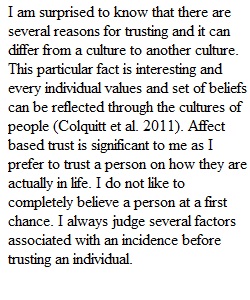


Q 1) For some personal insights - take the Trust Propensity Assessment. This is just a snapshot but it gives info and you can think about why. Surprised to know there are different reasons to trust and that it may vary across cultures?. What factors are important to you? And applying other concepts, which forms of justice are most important or relevant to you? why? How do you experience them in your workplace, on teams, other settings? Use chapter concepts to connect with your responses. (Good also to ask about in interviews.) 2) A common excuse about cheating is that everyone does it. But why and how to handle it? As a group, read the exercise on unethical behavior on page 222 that describes problems at a supermarket chain. What are the connections to our work? Did it change after you read the second part? How to deal with it? As a group, summarize key points and actions. 3) Cheating also occurs in classrooms How can you argue both for and also against it? In the classroom, there are systems like turn it in, lockdown browsers and cameras that try to prevent it through surveillance. Is this needed? Again, think about the reasons for and against the systems. What expectations are there for us as students (or as employees)? 4) any other points, "ahas" or questions?
View Related Questions